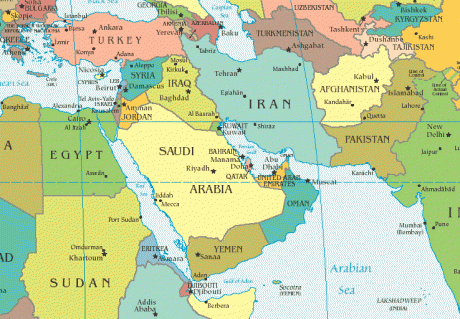
Geopolitical Shift in the Middle East: The War on ISIS Has Increased the Influence of Iran
Masud Wadan
Iran was not in a state to encroach the Middle East before 2003 when the US incursion into Iraq toppled the regime of Saddam Hussein and dissolved the erstwhile army. The invasion involuntarily rolled out new expectations for Iran as Saddam Hussein was a barrier to Iran’s extension of power into the Middle East. Iran fought an eight-year-long war with Iraq that cost it more than a million casualties in the 1980s.
The rise of the ISIS also presented Iran a great deal of opportunities to stretch its military hand into Iraq and Syria under the anti-ISIS operations. It delivered Iran strength to reshape its ties with regional powers such as Turkey and Russia. Moreover, the US’s invasion of Afghanistan to the east of Iran unlocked another door for Tehran by overthrowing the five year long rule of the Taliban regime that viewed Iran as a blood-enemy.
In September 2012, according to the Washington Post, Iraq refused the request of Washington to block the Iranian planes from traversing Iraqi airspace that were providing supplies to the Syrian government in its battle against Al Qaeda rebel forces.
The US doesn’t seem panicked regarding Iran’s increased influence in the region. The countries that need to worry are Saudi Arabia and Israel. Saudi Arabia might be well-armed to the teeth, but it doesn’t possess nuclear weapons to threaten Iran. Israel exploits the Saudi-Iran feud and nudges Saudi Arabia and its Arab allies towards the weakening of Iran’s position in the region or at least stop it from advancement.
With Iranian influence extending into Baghdad, Damascus, Beirut, and Sana’a, Iran directly and indirectly influences one-fifth of the Arab world. However, Iran’s ability to exert its influence in four Arab nations should be assessed in relation to the relative decline of Arab state power, not innate Iranian strength.
Iran’s joining of Russia in Syria in operations directed against Al Qaeda affiliated rebels including the ISIS contributed
- first to preventing the West/Israel and Saudi Arabia from taking hold in Syria,
- second, it paved the ground for Iranian forces to stay behind in Iraq and Syria even after Russia declared its troops withdrawal from Syria, and
- thirdly, it enabled Iran to supply arms and resources to Lebanon-based Hezbollah via Syria.
In Iraq, Tehran’s policies have been largely successful, giving Iran an unprecedented degree of influence there at the expense of the US and of Baghdad’s Arab neighbors. A friendly Iraq is not only an important part of the Iranian-led “axis of resistance” but also serves as an opportunity for Iran to evade the increasingly harsh international sanctions regime and to continue financing regional groups.
Iran-supported Hezbollah was the main motive behind the latest Saudi-Lebanon standoff. Saudi Arabia in chorus with Israel intended to subvert the rule of Hezbollah in Lebanon by forcing Prime Minister Hariri into resignation and plunging the country into crisis.
Israel could be facing its own threat from Iran, and its military is actually relatively small and isn’t designed for large-scale foreign deployments. Because of the size of its force, Israel can’t sustain extended, high-attrition warfare of the sort Iran endured in the 1980s. Iran has over 534,000 personnel in active service match it with Israel’s power that is negligible. Yet, Iran’s annual defense spending of $13–15 billion is far less than Israel’s $59 billion, Saudi Arabia’s $90 billion, or the UAE’s $28 billion.
Saudi Arabia is safeguarded against Iranian assault by virtue of its domination of oil resources. The US’ huge stake in Saudi Arabia’s oil is guaranteeing the country’s flow of oil through the Persian Gulf. The US President Donald Trump has not criticized the tough and repressive Islamic rules in the Kingdom in the same way it has linked Iran to terrorism. Also, Saudis have been exempted from Trump’s travel ban.
 It is not just about the US’ bids for regime change in Iran that infuriates Iranians, the resentment dates back to 1953 when the CIA orchestrated the overthrow of Iran’s prime minister Mossadegh in 1953. (image left, source wikipedia)
It is not just about the US’ bids for regime change in Iran that infuriates Iranians, the resentment dates back to 1953 when the CIA orchestrated the overthrow of Iran’s prime minister Mossadegh in 1953. (image left, source wikipedia)
The recent regional developments especially the war on ISIS brought Iran and Russia further together. Iran positioned its mercenaries in Iraq and Syria. The Kurdish rebellion, on the other hand, helped in thawing Iran’s complicated ties with Turkey. Turkey later converted the trajectory from supporting the ISIS to joining the anti-ISIS bloc led by Russia and Iran.
Turkey’s downing of Russian fighter jet in Nov. 2015 didn’t injure duo’s relations for more than a year as Russian President Vladimir Putin offered unconditional support to Turkish President Recep T. Erdoğan after an attempted coup. The assassination of Russian ambassador to Turkey in 2016 in the midst of rapprochement was an attempt to bring the two neighbors’ relations back to an earlier worst state, but it failed.
A country’s behavior always changes based on its own strategic interests which is the same for Russia, Turkey and Iran. During the Cold War, Turkey was a key NATO ally against the Soviet Union. Iran supported the Afghan rebels against the USSR, while the USSR supported Iraq against Iran.
Iran is in quest of extending its Shiite doctrine into other regions that predates the founding of the Islamic Republic. Russia earlier criticized of Turkey’s “neo-Ottomanism” and the West is concerned over Russia’s “Eurasianism”, while Russia, China and Iran, in turn, are cautioning and anticipating for the US’s grand offensive plans originating in Afghanistan. Now the fear is of a resurgence of an imperial project.
Russia is taking a neutral side when it comes to Iran-Saudi Arabia standoff as it has close economic ties with each. It has sold advanced weaponry to both countries and only willing to act as a mediator. This is while Turkey as a Sunni power is proximate to Saudi Arabia than Iran. Turkey had banded together with Saudi Arabia in alliance with other regional powers against Syrian Government that is favored by Iran.
Saudi Arabia-Qatar’s cul-de-sac disclosed the previously unknown degree of Iran and Qatar’s close relations. This intimacy was so much that forced Saudi Arabia to go tough on Qatar and introduce a myriad of bans which Iran struggled to offset to some extent.
Egypt as a close ally of Israel and the US has not been warm to Iran in relation to Saudi Arabia. Following Saudi Arabia’s declaration of sanctions on Qatar, Egypt, the UAE and Bahrain imposed a blockade in July.
As a fresh opposition to Iran’s footing in Syria, France’s foreign minister has accused Iran of trying to create an “axis” of military and political influence stretching from Tehran through Iraq, Syria, and Lebanon to the Mediterranean Sea.
Speaking in an interview with France 2 television broadcast on December 12, Jean-Yves Le Drian said that rather than pursue ambitions to expand its military presence in the region, Iran as well as Russia should work with the United Nations to try to establish peace in war-torn Syria. He said:
“There is a Syria that needs to exist free from foreign powers and influence”
Keep in mind that he would not have said so if the ISIS won the war and the West settled there.
https://www.globalresearch.ca/geopolitical-shift-in-the-middle-east-the-war-on-isis-has-increased-the-influence-of-iran/5624089

